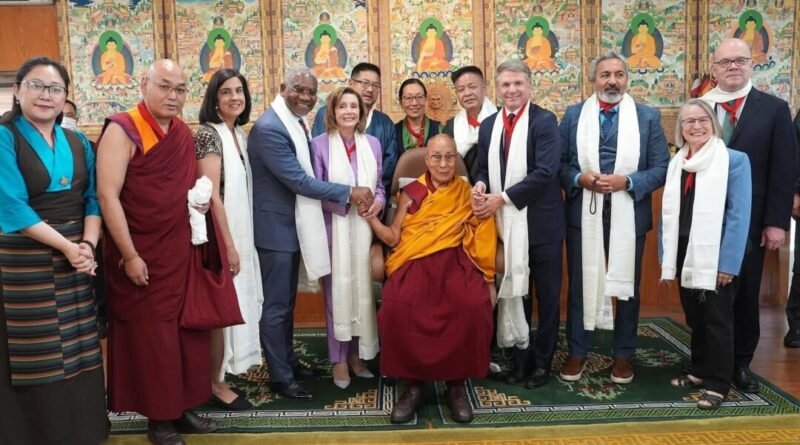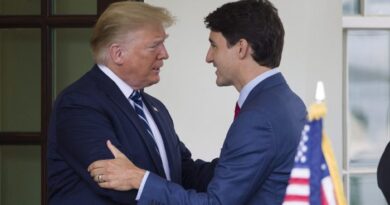Pelosi Holds Meeting with Exiled Tibetan Government in India During Xi’s Visit to Tibet
A U.S. congressional delegation met with the Dalai Lama, while Xi Jinping visited a Tibetan temple in Xinjiang.
News Analysis
NEW DELHI—A seven-member congressional delegation from the United States, led by Rep. Nancy Pelosi (D-Calif.) and Rep. Michael McCaul (R-Texas), visited Dharamshala, the seat of the Tibetan government in exile, on June 18.
On the same day, Chinese leader Xi Jinping visited the Tibetan Buddhist community in Qinghai, a province traditionally called Amdo by Tibetans. A Tibetan expert called the timing and manner of both visits highly symbolic.
The Himalayan town of Dharamshala has served as the seat of the Tibetan government in exile since 1960.
The U.S. delegation met with Tibet’s spiritual leader, the 14th Dalai Lama, on Wednesday, and later addressed a gathering of Tibetan exiles, including children from Tibetan schools. Meanwhile, Xi visited the ancient Hongjue Temple in Tibet’s northwestern province of Qinghai, according to a report from Chinese state media Xinhua.
After her meeting, Ms. Pelosi posted pictures of the bipartisan delegation with the Dalai Lama and Penpa Tsering, president of the Central Tibetan Administration, the Tibetan government in exile. Her post on X said she “strongly reaffirmed Congressional support for the people of Tibet.”
At a public meeting organized by the Central Tibetan Administration, Mr. McCaul, the chairman of the House Foreign Affairs Committee, said that the Chinese Communist Party (CCP) was “determined to end the Tibetan culture” after it “forcibly brought” the Tibetan people under its control.
After the brutal Chinese occupation of Tibet and a failed Tibetan uprising in 1959, the young Dalai Lama fled to India. The spiritual leader was followed by more than 80,000 Tibetans.
“Decades later, the Chinese Communist Party continues to threaten the freedom of Tibetan people and they have even attempted to insert themselves into the succession of the Dalai Lama. We’ll not let that happen,” Mr. McCaul said.
Ms. Pelosi spoke to the gathering about the “Resolve Tibet Act,” which was passed by the U.S. Congress last week. She said the bill sends a message to the Chinese regime that the United States has clarity on the issue and understands the value of Tibet’s freedom.
President Joe Biden is soon expected to sign the bill, which seeks to encourage the Chinese regime to talk to the Tibetan leaders—a process that has been stalled since 2010.
The former house speaker said the exiled Tibetan spiritual leader’s legacy “will live forever.”
The delegation also met with Indian Prime Minister Narendra Modi and his national security advisor, Ajit Doval, on Thursday. However, Mr. Modi’s office didn’t comment on the U.S. delegation’s visit to Dharamshala.
The U.S. congress members “expressed their strong support for further deepening Comprehensive Strategic Global Partnership in all areas, including trade, new and emerging technology, defense, people to people exchanges,” Mr. Modi’s office said.
The Timing of the Visit
The congressional delegation’s visit to India and meeting with the Dalai Lama took place just days before the 88-year-old spiritual leader was scheduled to visit the United States for knee surgery. Tibetologist and historian Claude Arpi told The Epoch Times that the visit raises several questions. The French-born Mr. Arpi now lives in India.
“Why did the U.S. delegation visit Dharamasala only a few days before the Dalai Lama leaves for the U.S. for knee surgery? They could have met in the U.S. This point has not been answered. It is probably to involve India in the larger U.S.–China confrontation,” Mr. Arpi said.
The timing of the visit was also linked to the Resolve Tibet Act, he said.
“The Act states that Tibet was an independent State. It is important for India which since the 1950s, shares a long and tense border confrontation with China,” particularly after the bloody Galwan conflict in May 2020, he said. For thousands of years, India’s northern boundary has been an Indo–Tibet border, he said.
The eastern sector of today’s India–China border, known as the McMahon Line, was agreed upon by British India and independent Tibet in March 1914, during a conference in Shimla, the summer capital of British India.
“If one accepts the Chinese contention that Tibet has been part of China since immemorial times, the McMahon Line lose its validity. In this sense, the new act and the visit of the U.S. delegation is important for India, as it revalidates the fact that Tibet was an independent nation before 1951,” said Mr. Arpi.
Xi Visits Xining
Chinese state media reported that Xi’s visit to Xining, Qinghai’s capital, was aimed at learning about initiatives to strengthen education and sinicize the Tibetan community.
The visit’s goal was to “promote the fine tradition of patriotism and love for religion in the Tibetan Buddhist community and promote national unity and progress,” Xinhua reported.
Mr. Arpi, however, cited pictures released by the state news agency, in which Xi is visible along with Tibetan monks in Hongjue Temple. The 7th century monastery is linked with “a previous Panchen Lama,” he said, giving it special significance.
Mr. Arpi stressed the symbolic meaning of the yellow umbrella presented to Xi, and the incense burned before the Chinese dictator during his visit to the temple.
The yellow umbrella is one of the “eight religious signs” of Tibetan Buddhism and is offered only to a Dalai Lama “or very high lamas,” Mr. Arpi said.
At a regularly scheduled press conference on Tuesday, Chinese foreign ministry spokesman Lin Jian asked the U.S. delegation to have no contact with the “Dalai group” and “stop sending the wrong signal to the world.”
“On the relevant act in the U.S. Congress, let me stress that Xizang [Tibet] has always been part of China since ancient times. Xizang’s affairs are purely China’s domestic affairs and no external interference will ever be allowed,” said Mr. Lin. The foreign ministry spokesman said that Tibetan society in China enjoys “social stability and harmony.”
Mr. Lin urged the United States not to pass the Resolve Tibet Act.
“We urge the U.S. side to adhere to its commitments of recognizing Xizang as part of China and not supporting ‘Xizang independence,’” he said.

A spokesperson for the Central Tibetan Administration told The Epoch Times that while the U.S. delegation’s visit to Dharamshala was extremely significant, particularly in light of the Resolve Tibet Act, the scenario shouldn’t be viewed only from the perspective of competitive geopolitics between the United States and China.
Rather, “this visit gives a timely space for China to rethink and change [its] repressive policies concerning the violation of Tibetan rights and freedom,” Central Tibetan Administration spokesman Tenzin Llekshay said in a written response.
The visit is also a chance to change the world for the better “by calling the Chinese leaders to restart the dialogue to resolve the longstanding Sino–Tibetan Conflict,” he stated.
The Tibetan spokesman called for positive thinking from the Chinese regime and said that the Central Tibetan Administration is calling for a mutually beneficial solution.
“Since the Central Tibetan Administration is consistently following the Middle Way Policy for the genuine autonomy for the Tibetan people, which is a mutually beneficial solution, China must attempt to think positively and act upon starting the dialogue not just for the sake of Tibetan people but for their own interest and the world,” he said.





